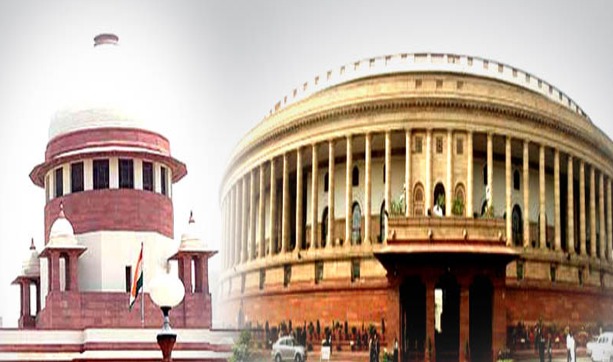
The Supreme Court on Friday dismissed a public interest litigation (PIL) seeking a declaration that citizens have a fundamental right to file direct petition Parliament and invite consideration on major public-interest issues.
A Bench of Chief Justice of India (CJI) DY Chandrachud with Justices PS Narasimha and JB Pardiwala declared that a person cannot demand a right to stand up in Parliament.
“Go talk to people outside Parliament. Go to your local MP and present a petition. But a citizen cannot seek the right to stand up in Parliament. Sorry,” the bench stated.
The Court further observed that the relief sought fell exclusively within the domain of Parliament and state legislatures. Therefore, such directions could not be passed in a PIL.
“We must draw a line, and we cannot tell Parliament what to do.”
A submission was made by Solicitor General Tushar Mehta and Additional Solicitor General Aishwarya Bhati that there was already a procedure in place to receive petitions from citizens was also taken on record.
The petition was previously listed before a bench of Justices KM Joseph and BV Nagarathna, who had taken an unfavourable view of the same, opining that accepting the requests could impede the functioning of Parliament.
That Bench had questioned whether the plea was maintainable, given that the Lok Sabha and Rajya Sabha were made parties rather than their Secretaries-General.
The petitioner seeked for the establishment of a system, regulations, and regulatory framework that would allow citizens to petition Parliament in order for it to hold debates, discussions, and deliberations on issues and concerns raised by citizens.
The petitioner specifically requested that the Supreme Court to declare that citizens have a fundamental right to do so under Articles 14, 19(1)(a), and 21 of the Constitution.
It emphasised that there is no valid reason to deny citizens the opportunity to fully realise the promise of participatory and direct democracy by engaging with Parliament on issues of broader public interest.
The following procedure was proposed in the petition:
- If a sufficient number of signatures are gathered, then the petition will be turned into a Public Petition, which will then be published on a platform and made visible to the public.
- At this point, if the Public Petition receives more public support in the form of signatures, a written response from the respective government department/ministry would be mandated.
- If the signatures on the petition cross a higher threshold requirement with respect to the number of signatures that are to be obtained, after being converted into a Public Petition, then it would be identified as an Extraordinary Petition involving an issue concerning a high number of citizens, which would immediately mandate that the issue be formally taken up for discussion in Parliament.




